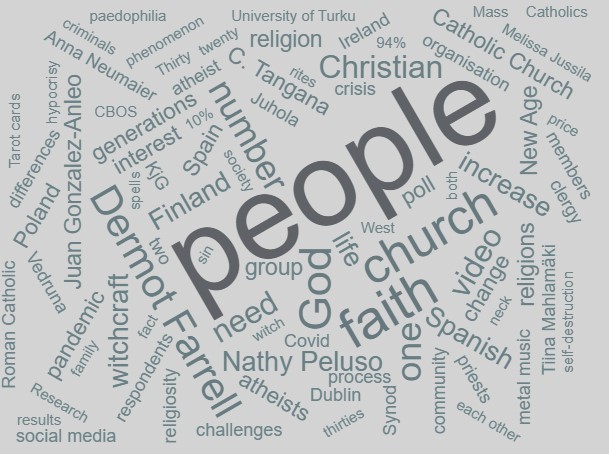Insights from the dashboard: The generational divide over religious affiliation
Insights from the dashboard: The generational divide over religious affiliation
The EARS dashboard shows that a generational divide over religious affiliation in Europe has been occurring over the past year.
The EARS dashboard offers different perspectives on various topics surrounding the relationship between religion and society in Europe. Over the past 12 months, our international team of analysts has added over 3,400 summaries of articles published by the European media. The dashboard offers various insights on themes that are discussed in these articles. It allows users to explore the interrelations between different topics, the prevalence of particular themes, and connections to global developments.
Over the past few years, the COVID-19 pandemic has had an undeniable impact on religion in Europe. In particular, a succession of lockdowns forced people inside and created a disconnect between communities, and importantly, generations. Such a disconnect manifested itself in a multitude of ways, including when it came to religious (de)affiliation.
This shift can be seen in summaries added to the EARS dashboard. Since July 2021, there have been 114 summaries added to the dashboard that feature the keyword religious conversion. 12 of these summaries feature the keywords religious conversion and generational conflict. This article will look at case studies of three different countries and summaries from these locations to understand the relationship between religious conversion and generational conflict.
Impact of the COVID-19 pandemic: Spain and France
For the past several years, Spain has been on the path to becoming a more secular country, a path the country looks set to continue on.[1] One summary added to the dashboard from April 2022 explains how new research, conducted by the Ferrer i Guàrdia Foundation, states that the COVID-19 pandemic has “accelerated the loss of religiosity and the secularisation of Spanish society.”[2] The number of atheists in Spanish society increased from 27.5% in 2019 to 37.1% in 2021.[3] In particular, the divide between generations is apparent within these statistics – 63.5% of 18-24-year-olds do not identify as religious.[4] The article explains that “strong social changes” have occurred due to the fact that people were more confined to their homes as a result of the pandemic.[5]
Moreover, another summary of an article entitled Young Spaniards believe more in Tik Tok than in priests further reinforces the fact that religion is of minimal importance to young adults. Another study shows that young people have accumulated two major consecutive crises (the Great Recession of 2008 and the Russian war) and a pandemic, which “has left them with a precarious life.”[6] These experiences have resulted in a loss of optimism and faith, with almost 75% of young Spaniards believing that religion is not very important and “only 3.9% believe that important things are said in churches.”[7]
Interestingly, in comparison to Spain, in France, a country with a long history of secularism, generational divides over religious affiliation have not been so apparent in recent years. A summary from September 2021 shows how a poll has revealed that 51% of French citizens surveyed do not believe in God.[8] Unsurprisingly, the largest numbers of believers were found among older generations. However, whilst smaller, 48% of 18-34-year-olds still said that they did believe in God.[9] Furthermore, compared to the articles from Spain, this poll suggests that the pandemic had a minimal influence on whether or not people believed in God.[10]
The rise of alternative religions: Finland
In Finland, the relationship between religious affiliation and generational conflict is being shaped by the rise of alternative religions capturing the imaginations of young Finns. One summary from December 2021 explains research conducted by Tiina Mahlamäki from the University of Turku. Mahlamäki states that Finns, especially young adults, have been missing a “sense of enchantment in our rational society.”[11] This has led many to turn away from the Evangelical-Lutheran church in Finland and towards New Age religions.[12]
The article gives the example of Melissa Jussila, who was raised in a Jehovah’s Witness family but always had an interest in modern witchcraft. Jussila was rejected by her religious community and parents due to her beliefs but now she lives freely and practices witchcraft.[13] In this case, we clearly see a generational divide over religious affiliation and conversion at play.

As the word cloud suggests, New Age Religions have become more popular amongst younger generations in Finland but also more widely across Europe and the rest of the world because they are more visible on social media. Jussi Sohlberg, research coordinator of the Church Research Center, believes that it is not the case that neo-spiritual elements have become mainstream in a few years but instead it just seems so because of social media.[14] Similarly to Mahlamäki, Sohlberg explains that while young Finns are moving away from traditional religiosity, they still need spirituality to replace it – something that “appeals to the era of individuality.”[15] Therefore, amongst young adults, in comparison to Spain, in Finland it appears to be a case of religiosity changing rather than disappearing.
Generational divides: the reality
In conclusion, the summaries from the three countries selected highlight a few key changes in the relationship between religious conversion and generational conflict. In Spain, it is clear that a generational divide, exacerbated by the COVID-19 pandemic, has occurred between older generations who are more likely to identify as religious and younger generations who no longer feel religion is of importance to their lives. In France, when it comes to religious affiliation, such a stark divide between generations is not occurring although there is an overall decline in religious identification. Finally, in Finland, younger generations are distinguishing themselves by converting to other less traditional forms of religion. It will be interesting to see whether these trends continue to develop in years to come.
Learn more on the EARS dashboard
The EARS dashboard allows you to gain insight into a large number of topics, including abuse. It is a free tool that allows you to make connections like those described above, and to find out about relationships between interesting subjects across Europe. Please visit the dashboard to learn more.
Sources
[1] Losing their religion? New report shows Spaniards are turning their backs on faith | Life in Spain | EL PAÍS English Edition
[2] La pandemia aceleró el proceso de secularización en España
[3] La pandemia aceleró el proceso de secularización en España
[4] La pandemia aceleró el proceso de secularización en España
[5] La pandemia aceleró el proceso de secularización en España
[6] Los jóvenes españoles creen más en Tik Tok que en los curas
[7] Los jóvenes españoles creen más en Tik Tok que en los curas
[8] Less than half of people believe in God in 2021, French poll finds
[9] Less than half of people believe in God in 2021, French poll finds
[10] Less than half of people believe in God in 2021, French poll finds
[11] Noidaksi itseään kutsuva Melissa: “Noituus on ollut minussa aina, vaikka uskossa eläminen tukahdutti sitä” – Dokumentit – yle.fi
[12] New Age movement | religious movement | Britannica
[13] Noidaksi itseään kutsuva Melissa: “Noituus on ollut minussa aina, vaikka uskossa eläminen tukahdutti sitä” – Dokumentit – yle.fi
[14] Miksi sukupolvi Z hurahti tarot-kortteihin ja energiakiviin, joita moni pitää huuhaana? Rituaaleja dissaava voi yllättyä, sillä tutkimus paljasti kiistattoman hyödyn – Ilmiöt – Ilta-Sanomat
[15] Miksi sukupolvi Z hurahti tarot-kortteihin ja energiakiviin, joita moni pitää huuhaana? Rituaaleja dissaava voi yllättyä, sillä tutkimus paljasti kiistattoman hyödyn – Ilmiöt – Ilta-Sanomat






